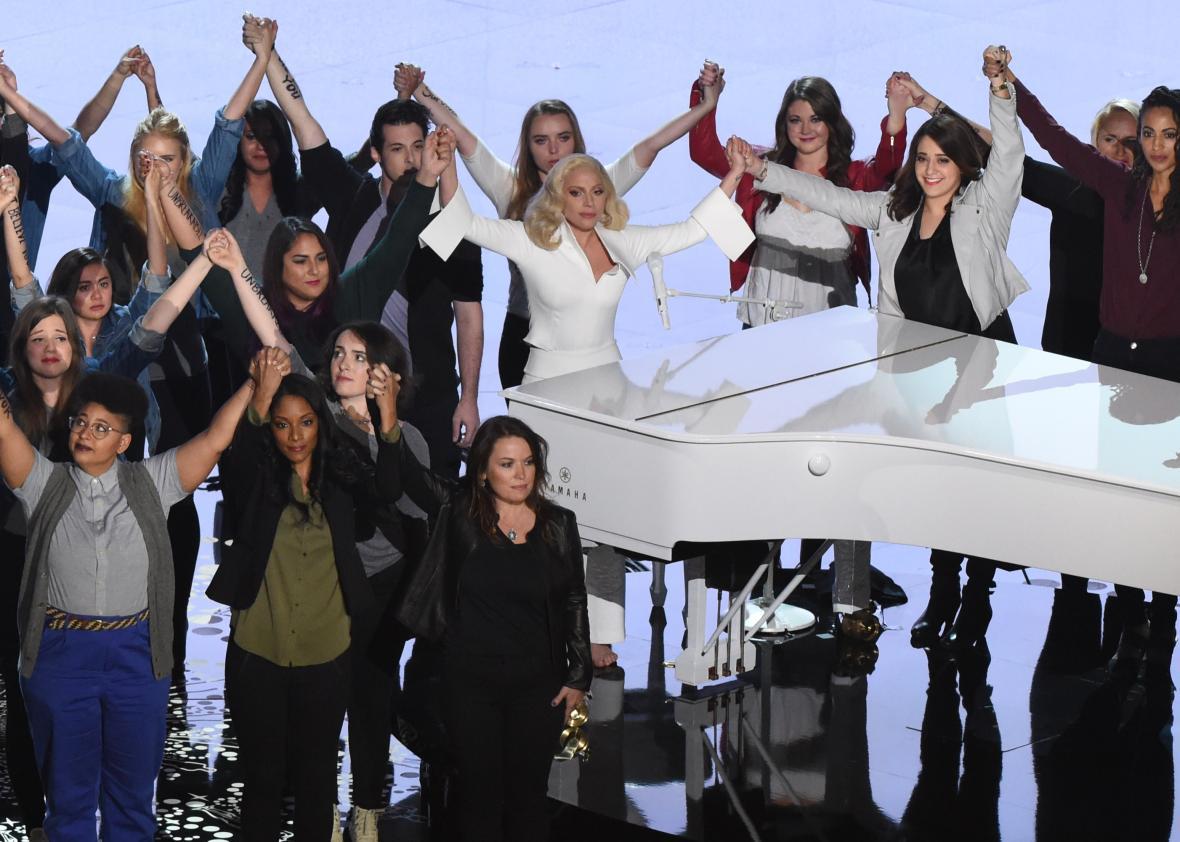I’m going to say something impolitic: “Til It Happens to You,” the rock ballad about the aftermath of sexual assault that Lady Gaga belted in a genuinely moving—if slightly overwrought—performance at Sunday night’s Oscars, is not a very good song.
It has a very good message: that no one can know another person’s trauma nor should presume to tell a survivor lost in a highly personal labyrinth of pain that “you’ll be fine.” But as other critics have pointed out, “Til It Happens to You” is even more vague than Gaga’s other empowerment-slanted hits, such as “Born This Way.” Its efforts to articulate how it feels to be a rape victim—“your world burns and crashes,” “you’re at the end, the end of your rope”—display an odd mixture of schmaltzy hyperbole and cautious aversion to saying anything that hasn’t been said a million platitudinous times before.
And yet, Gaga had her celebrity audience—and, judging by the reactions on Twitter, viewers around America—misty-eyed and on their feet Sunday night. While the performance suffered from a touch of melodrama and overproduction at first, it gained profound gravity when 50 survivors of sexual violence were revealed, holding hands in silhouette, as a backdrop lifted in the middle of the song.
The Oscars can feel like America’s smuggest ritual of self-celebration. Every year, no matter how many bones the populace at large has picked with the show’s exclusion of women, minorities, and queer people, the rich and beautiful don their $100,000 gowns and revel in whatever version of the country our most iconic creative industry has chosen to reflect. The actors and actresses who depicted trauma on screen have been sleeked-down and made-up, and when they appear at the podium to collect their statuettes, it can feel as if we’re applauding the ability of these pretty people to transform themselves into the vulnerable and victimized, and then to transfigure effortlessly back again. So, even if it was literal-minded of Gaga—who has talked about her own experience of sexual assault—to surround herself with survivors while she sang, it was also thrilling to see these women and men step into the light, revealing their faces, their street clothes, and the writing on their arms that bore messages like “not your fault” and “unbreakable.” Instead of actors pretending to be everyday people, these were everyday people mustering the courage to play themselves onstage. Even their messy, uncoordinated victory sign at the end of Gaga’s set was poignantly real, creasing the gleaming surface of a night usually dedicated to illusion.
As the survivors exited the stage, Brie Larson—who later in the night won Best Actress for her portrayal of a woman who is abducted, raped, and held in captivity in Room—positioned herself to hug each and every one. I don’t know whether the recipients found her gesture moving, or whether some would’ve preferred to hustle off in peace. But there was something potent about seeing the Hollywood version touch, momentarily, the real experience.
At the beginning of Gaga’s performance, the audience saw her, seated at the piano, through a blue, rectangular frame. Her song is in large part about the fact that survivors can’t be “put in a box,” prescribed a set of feelings or a timeline for recovery. Sunday night, it was also a reminder that thinking about violence and trauma through the frame of movies with tidy plotlines—and through the bodies of actors and actresses who, no matter how the story ends, will be sparkling in their taffetas and silks again come awards season—isn’t enough. For art to change society, our celebration of Larson’s performance in Room must provoke thoughts about the real-life survivors of sexual violence. For a simple song, Gaga’s “Til It Happens to You” did a powerful job conveying that complex message.
